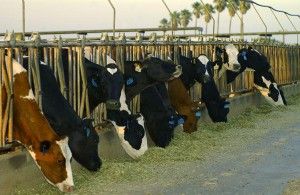CA forges ahead with new animal laws
Not only humans were affected by the spate of new bills signed into law by Gov. Jerry Brown. From pigs to whales, lawmakers succeeded in changing the way animals are treated in California.
Strengthening antibiotics
 Just seven lawmakers voted against a bill that cracked down on the excessive administration of antibiotics to farm animals, according to Bloomberg Business. “Overuse of antibiotics, both in medicine and in animal agriculture, contributes to the rise of drug-resistant superbugs that kill 23,000 Americans each year and sicken 2 million. Brown vetoed a weaker bill last year,” noted the website.
Just seven lawmakers voted against a bill that cracked down on the excessive administration of antibiotics to farm animals, according to Bloomberg Business. “Overuse of antibiotics, both in medicine and in animal agriculture, contributes to the rise of drug-resistant superbugs that kill 23,000 Americans each year and sicken 2 million. Brown vetoed a weaker bill last year,” noted the website.
The overwhelming consensus against the practice provided a sort of mirror image of the recent determination to remove the personal belief exemption from California’s rules guiding the mandatory vaccination of children. There, similar concerns about a growing threat of public disease arose from the rise of a movement among parents to delay or skip vaccines. In animal agriculture, however, the controversy around vaccinating humans was out of the picture, smoothing the way for the bill’s passage and signature into law.
Following the state’s trend of passing regulations more stringent than those handed down from Washington, lawmakers raised a strict standard for treating herd animals with antibiotics. “Currently, many antibiotics are available without a prescription from a veterinarian. The new law, which takes effect on Jan. 1, 2018, requires a prescription based on a veterinarian’s judgment that the antibiotics are medically necessary,” the Los Angeles Times reported. “The new state law is tougher than federal law in prohibiting a regular pattern of use of antibiotics as a preventative measure to farm animal herds. There must be an elevated risk to justify using it with animals that are not sick.”
Failure to comply would trigger escalating fines. “Firms are subject to civil money penalties of up to $250 for each day a violation occurs,” as Politico noted. “Subsequent violations could bring an administrative fine of $500 for each day.”
Regulating whales
Meanwhile, California regulators have moved to make it more difficult to keep whales captive. “SeaWorld has suffered another hit to its killer whale show after the California Coastal Commission banned it from breeding orcas in captivity as a condition of its approval of the struggling San Diego theme park’s $100 million expansion,” reported Vice News. “The new conditions, which were attached to an approval of the park’s Blue World expansion, set to open in 2018, prohibits all whale breeding, including the use of artificial insemination. It also bans the sale, trade, or transfer of captive orcas.”
 SeaWorld came under sustained attack in the wake of a critical documentary that mobilized opposition to its famous orca shows and programs, which require the whales to be kept in conditions considerably different from those they adopt in the wild.
SeaWorld came under sustained attack in the wake of a critical documentary that mobilized opposition to its famous orca shows and programs, which require the whales to be kept in conditions considerably different from those they adopt in the wild.
The decision came with a possible loophole. SeaWorld had wanted to expand its tanks, a project that would facilitate more breeding. As a condition of approval, however, the Commission blocked that possibility — giving SeaWorld an opportunity to back out, but one that could come at a price. As Humane Society lobbyist Jennifer Fearing told the Associated Press, “it risks giving the public the perception that it never intended to build bigger tanks to benefit the park’s 11 killer whales and would rather simply breed more in captivity.”
Popular poultry
Lawmakers did not intervene this year in at least one increasingly relevant aspect of animal law: the cultivation of so-called “backyard” chickens. “Chicken-mania is sweeping the Bay Area,” the Contra Costa Times reported, “with burgs big and small scrambling to regulate the popular trend of backyard birds and their coops — and keep the peace between neighbors who might not enjoy all the clucking going on next door.” Legislators in Sacramento could step in if municipalities can’t keep up. Local rules vary widely and do not always command respect. Hayward’s prohibition of poultry “in most of the city’s neighborhoods,” the Times observed, “is largely ignored by underground chicken lovers.”
Related Articles
Dutton's CARB bill moves to floor
This is from Sen. Dutton’s office today: Dutton Air Board Transparency Measure Moves to Senate Floor SACRAMENTO – A bill
Even Dogs Have A Nanny In CA
Katy Grimes: A California state Senator has authored a bill which would regulate pet grooming and require dog groomers to pay
Legislators Steer Clear of Super Bowl
Though just over 100 miles from the Capitol, state legislators showed no love for Sunday’s Super Bowl between the Denver Broncos




